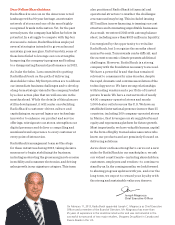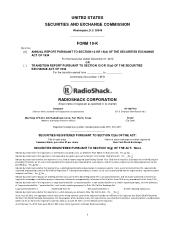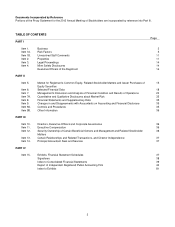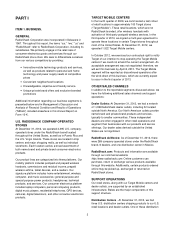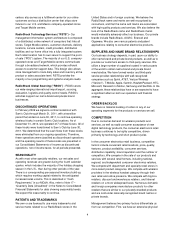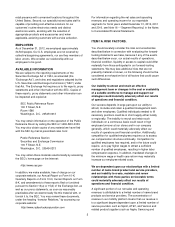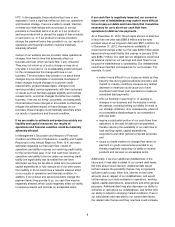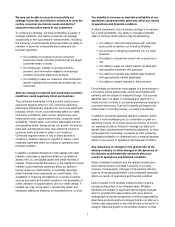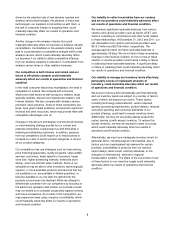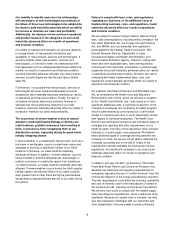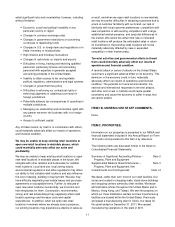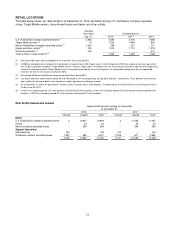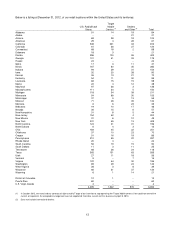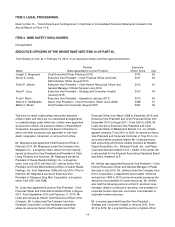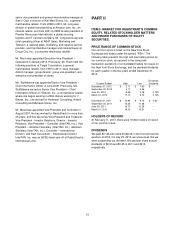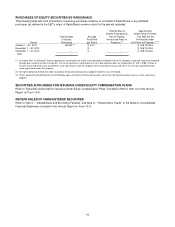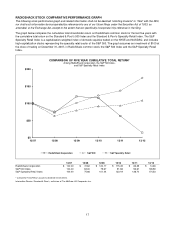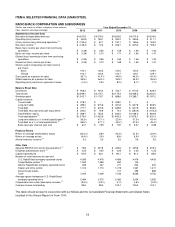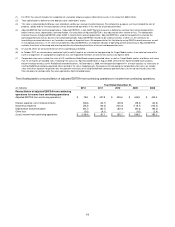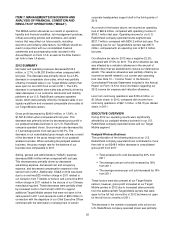Radio Shack 2012 Annual Report Download - page 12
Download and view the complete annual report
Please find page 12 of the 2012 Radio Shack annual report below. You can navigate through the pages in the report by either clicking on the pages listed below, or by using the keyword search tool below to find specific information within the annual report.10
through the due diligence procedures we implement the
origins of all minerals used in certain of these products.
Risks associated with the suppliers from whom our
products are sourced could materially adversely affect
our results of operations and financial condition.
We utilize a large number of suppliers located in various
parts of the world to obtain private brand merchandise and
other products. If any of our key vendors fail to supply us
with products, we may not be able to meet the demands of
our customers, and our sales and profitability could be
materially adversely affected.
We purchase a significant portion of our inventory from
manufacturers located in China. Changes in trade
regulations (including tariffs on imports) could increase the
cost of those items. Although our purchases are
denominated in U.S. dollars, changes in the Chinese
currency exchange rate against the U.S. dollar or other
foreign currencies could cause our vendors to increase the
prices of items we purchase from them. The occurrence of
any of these events could materially adversely affect our
results of operations and financial condition.
Our ability to find qualified vendors that meet our standards
and supply products in a timely and efficient manner is a
significant challenge, especially with respect to goods
sourced from outside the United States. Merchandise
quality issues, product safety concerns, trade restrictions,
difficulties in enforcing intellectual property rights in foreign
countries, working conditions, work stoppages, child labor
laws, transportation capacity and costs, tariffs, political or
financial instability, foreign currency exchange rates,
monetary, tax and fiscal policies, inflation, deflation,
outbreak of pandemics and other factors relating to foreign
trade are beyond our control. Concerns regarding the
safety of products and services that we source from our
suppliers and then sell could cause shoppers to avoid
purchasing certain products and services from us, even if
the basis for the concern is outside our control. Any lost
confidence on the part of our customers would be difficult
and costly to reestablish. These and other issues affecting
our vendors could materially adversely affect our sales and
profitability.
Our business is heavily dependent upon information
systems, which could result in higher maintenance
costs and business disruption.
Our business is heavily dependent upon information
systems, given the number of individual transactions we
process each year. Our information systems include an in-
store point-of-sale system that helps us track sales
performance, inventory replenishment, product availability,
product margin and customer information. These systems
are complex and require integration with each other, with
some of our service providers, and with our business
processes, which may increase the risk of disruption.
Our information systems are also subject to damage or
interruption from power outages, computer and
telecommunications failures, computer viruses, security
breaches, catastrophic events and errors by our
employees. If we encounter damage to our systems,
difficulty implementing new systems, security breaches of
our systems, or difficulty maintaining and upgrading current
systems, our business operations could be disrupted, our
sales could decline, and our expenses could increase.
Failure to protect the integrity and security of our
customers’ information could materially damage our
standing with our customers and expose us to
litigation.
Increasing costs associated with information security,
including increased investments in technology, the costs of
compliance with consumer protection laws, and costs
resulting from consumer fraud could materially adversely
affect our results of operations. Additionally, if a significant
compromise in the security of our customer information,
including personal identification data, were to occur, it could
materially adversely affect our reputation, results of
operations and financial condition, and could increase the
costs we incur to protect against such security breaches.
To date, we have not experienced a significant security
compromise.
We are subject to other litigation risks and may face
liabilities as a result of allegations and negative
publicity.
Our operations expose us to litigation risks, such as class
action lawsuits involving employees, consumers and
shareholders. For example, from time to time putative class
actions have been brought against us relating to various
labor matters. Defending against lawsuits and other
proceedings may involve significant expense and divert
management’s attention and resources from other matters.
In addition, if any lawsuits were brought against us and
resulted in a finding of substantial legal liability, it could
cause significant reputational harm to us and otherwise
materially adversely affect our results of operations and
financial condition.
We conduct business outside the United States, which
presents potential risks.
We have offices, assets, personnel, or generate a portion of
our revenue, in Mexico, Hong Kong, Taiwan, Southeast
Asia, and China. Part of our growth strategy is to expand
our international business because we believe the growth
rates and the opportunity to implement operating
improvements there may be greater than those typically
achievable in the United States. International operations


